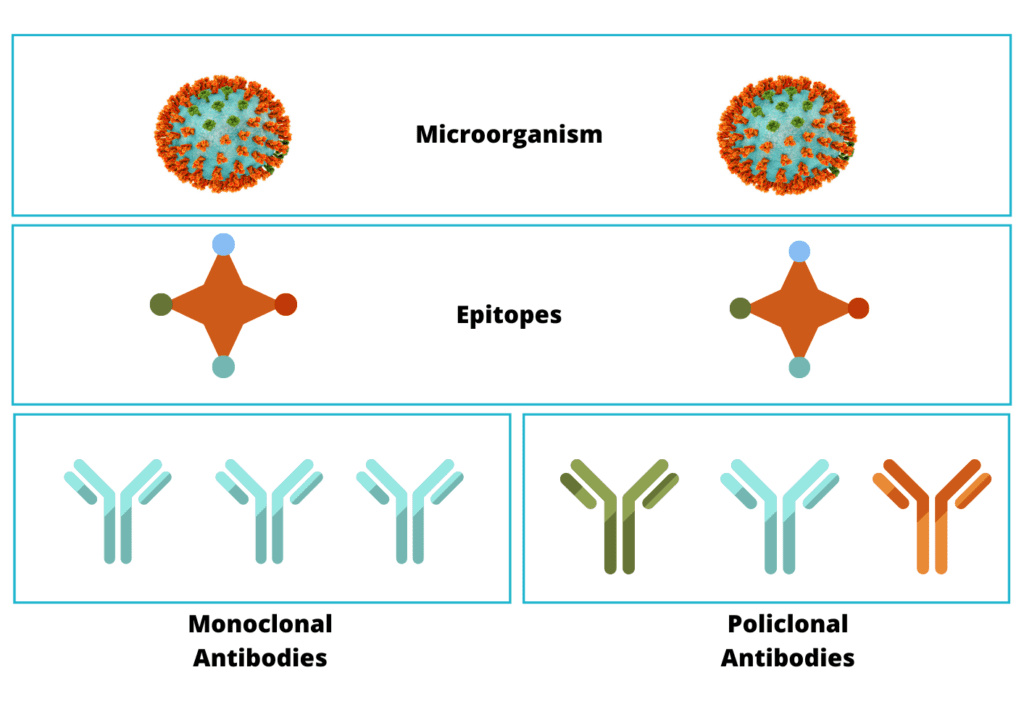Sometimes, it is difficult to find the antibody that suits our needs is not available. Occasionally, those commercially available do not work well for our application, or with our type of samples. Other times, it is not commercially available, or we need to have it exclusively and regularly. If one of those is the case, we might consider producing custom-made antibodies for our research and purpose.
However, deciding between developing a monoclonal or polyclonal antibody is not always an easy task. How do I choose between one or the other?.
Firstly, the differences between monoclonal and polyclonal antibodies might be considered. Monoclonal antibodies are identical antibodies or clones, as they are produced by the same B cell. Thus, monoclonal antibodies are capable of recognizing the same epitope of a target protein. Polyclonal antibodies, however, are a heterogeneous mixture of antibodies produced by several B cells, and will therefore recognize several epitopes of the same protein.

For more information about the differences between both antibody types, look up the following post.
¿How should I choose between monoclonal and polyclonal antibodies?
When choosing between producing custom-made antibodies, either monoclonal or polyclonal, we should analyse the characteristics of each one, as well as their applications. The following table summarizes some key points to take, to make the election easier.
| Antibody Type | Advantages | Disadvantages | Applications |
| Polyclonal | – High affinitty – Cost-effective – Less delivery time – No epitope-specific | – No epitope-specific – Batch variability – Low reproducibility | – WB – IHQ detection – Direct ELISA – Indirect ELISA – IP |
| Monoclonal | – High specificity – Epitope specific – High reproducibility – No batch variability | – Higher cost – Greater delivery time – Small variations in the protein might result in the inability to recognize it. | – IHQ quantification – Competitive ELISA – Sandwich ELISA – FACS |
It is essential to be clear about the application and use that we want to make of our custom-made antibodies, since there are cases in which an apparent inconvenience can actually be a great advantage. For example, there is a widespread belief that monoclonal antibodies (mAb) are of higher quality than polyclonal antibodies (pAb), simply because they are more specific.
Contrary, the lack of specificity, which is generally shown to be a disadvantage of polyclonal antibodies, can be very valuable depending on the application, as in the cases presented here:
- Polyclonal antibodies are a heterogeneous mixture of immunoglobulins that recognize different epitopes of the same protein, so it is possible that several of them bind simultaneously to our target, resulting in an increased signal.
- In addition, when recognizing several epitopes, small structural changes in the target protein will not affect the recognition; providing robustness to the experiment.

However, for an assay that requires high specificity, for example, when it is intended to discriminate between two isoforms of a protein or a larger study in which homogeneity between batches is an essential requirement, the most appropriate choice would be the generation of a monoclonal antibody.
As a general rule, polyclonal antibodies are more appropriate to carry out qualitative tests, while monoclonal ones provide better results in quantitative techniques.
In cases in which affinity plays a more important role than specificity, it would be most appropriate to opt for obtaining a polyclonal antibody. This is the case using for example immunoprecipitation (IP) techniques.
It is also advisable to use a polyclonal when we work on a very basic proof of concept for which the budget is tight. If we later need to scale up, once the protocol is validated, it would be recommendable to acquire a monoclonal antibody.
In summary, the differences between monoclonal and polyclonal antibodies are evident, but this does not mean by itself that one is of higher quality than the other. Everything depends on the application, the technique used, the budget available, and the medium-long-term needs.



